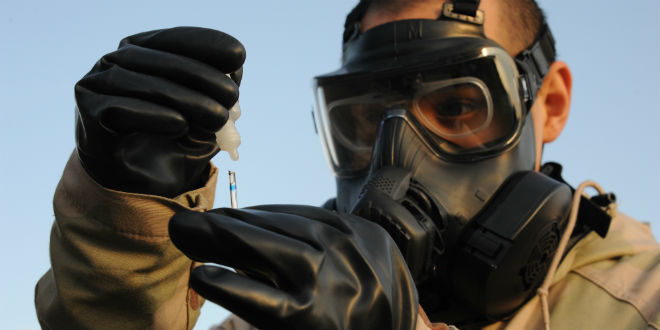The Islamic State (ISIS) on Saturday launched two chemical attacks, killing a three-year-old girl and wounding 600 others. The early morning attack, which took place in the town of Taza in northern Iraq, caused hundreds more to flee the area, IOL reported.
Sameer Wais, whose daughter Fatima was killed in the attack, is a member of a Shi’a militia fighting ISIS. Wais said he was on duty nearby when he heard the explosion. He immediately ran home and found Fatima badly hurt with the scent of chemicals in the air, presumably from the rockets.
Said Wais, “We took her to the clinic and they said that she needed to go to a hospital in [the northern Iraqi city] Kirkuk. And that’s what we did.” Fatima appeared to be doing better the next day, so they brought her home. “But by midnight, she started to get worse. Her face puffed up and her eyes bulged. Then she turned black and pieces of her skin started to come off,” he said.
Sadly, Fatima died the next morning, Wais said.
Helmi Hamdi, a nurse at the Taza hospital, said the wounded are suffering from similar symptoms that Fatima initially displayed: infected burns, suffocation, and dehydration. Eight people were transferred to Baghdad for further treatment, Hamdi said.
“There is fear and panic among the women and children,” said Adel Hussein, a local official in Taza.
Hussein relayed that forensics teams from Germany and America arrived in the area following the recent attack to test for the presence of chemical agents. They discovered, however, that the components being used, chlorine and low-grade sulfur mustard, are non-threatening. Hamish De Bretton Gordon, a former British army officer and chemical weapons expert, explained that the mustard agent that ISIS is using is not very toxic, although its physiological impact far outweighs the physical.
Additionally, experts said the radical group appears incapable of launching a large-scale chemical weapon offensive. Such an attack requires the proper equipment, materials, and a supply chain to produce enough chemicals to pose a significant threat, let alone the expertise necessary to manage and execute the operation, they said.
Just last month, US special forces captured the head of the ISIS unit whose job was to develop chemical weapons, thereby erasing the potential leader of a large scale chemical warfare operation.
Due to the low-grade level of chemicals, as well as the removal of the operative behind ISIS chemical warfare, the threat, while legitimate, is not cause for too much concern at the moment. “It’s not a high threat. We’re not, frankly, losing too much sleep over it,” US Army Col. Steve Warren told reporters Friday.
Regardless, the threat is very real for the citizens of Taza. Just three days before Saturday’s attack, Taza was again struck by rockets loaded with chemical weapons.
The use of chemical warfare is no doubt the fulfillment of a prophecy in the making. Zechariah speaks of a plague that shall afflict the world in such a way that “their flesh shall consume away while they stand upon their feet, and their eyes shall consume away in their sockets, and their tongue shall consume away in their mouth.” (Zechariah 14:12).
“What the [Islamic State] terrorist gangs did in the city of Taza will not go unpunished,” Iraqi Prime Minister Haider al-Abadi said during a meeting with village elders in Taza on Saturday.
“The perpetrators will pay dearly.”
The post Islamic State Bombs Iraqi Town With Chemical Weapons appeared first on Breaking Israel News | Israel Latest News, Israel Prophecy News.
Source: Israel in the News


